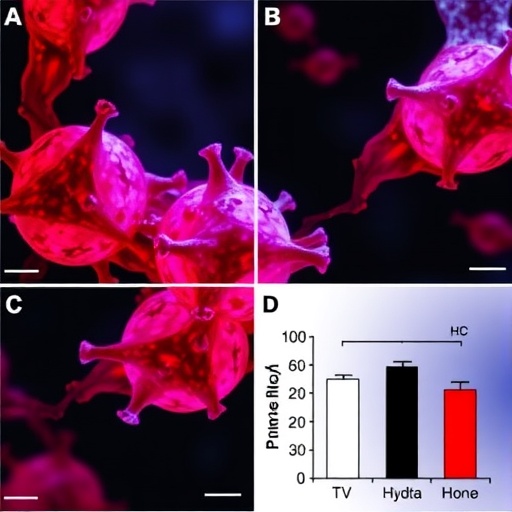In a groundbreaking study that promises to shift the landscape of cancer therapy, researchers have uncovered a radical approach to overcoming a major roadblock in the effectiveness of CAR-T cell treatments in solid tumors. Led by a talented team of scientists including Zhou, Xu, and Hu, the study focuses on the role of PIM3, a protein kinase linked to cellular metabolism, and its inhibition in reverse engineering the dysfunction often caused by the hypoxic microenvironment in tumors. The implications are vast, suggesting a new path for enhancing the efficacy of CAR-T cell therapy in notoriously challenging solid tumors.
Solid tumors, notoriously resistant to treatment due to their unique microenvironments, represent a significant hurdle in the realm of oncology. The presence of hypoxia, or low oxygen levels, within these tumors has been shown to impair the function of CAR-T cells, which are engineered to attack cancer cells. The current therapeutic landscape often leaves patients with limited options, as conventional treatments struggle to penetrate these dense, oxygen-deprived environments. This new research introduces a potential remedy, promising to rejuvenate the once-promising CAR-T therapies that have faced setbacks in these contexts.
In this elucidating research, Zhou et al. meticulously demonstrate how PIM3 inhibition could effectively reset the metabolic state of T cells, facilitating their recovery from the detrimental effects of hypoxia. The study’s authors employed a combination of in vitro and in vivo experiments, showcasing that T cells mutated with PIM3 inhibition displayed heightened metabolic activity, improved proliferation, and increased survival rates in the hypoxic conditions typical of many solid tumors. This innovative method could pave the way for the next generation of CAR-T cell therapies, specifically tailored for tougher cases of cancer.
The metabolically reprogrammed T cells exhibit a switch from oxidative phosphorylation to a more glycolytic state once PIM3 is inhibited. This critical shift is significant, as glycolysis supports a higher rate of ATP production necessary for effective immune responses, especially in low-oxygen conditions. The ability of T cells to adapt their metabolism in response to the tumor microenvironment is not merely a biological curiosity; it represents a profound understanding that could lead to targeted therapies that enhance T cell functional longevity and performance against cancer.
Additionally, the study highlights the genomics underlying this metabolic remodeling. A detailed analysis reveals that PIM3 inhibition affects a suite of genes related to cellular metabolism and immune regulation. Targeting PIM3 and the metabolic pathways it influences could open a treasure trove of insights and therapeutic options for oncologists, thereby reinvigorating the discussions around CAR-T cell strategies in treating solid tumors.
The implications of this research extend beyond simply reversing a cellular dysfunction; they speak to the need for a paradigm shift in the way we consider cancer treatment. The traditional view of targeting cancer directly through direct cytotoxic approaches is evolving into a multifaceted strategy that incorporates the tumor microenvironment’s significant role. By recognizing that restoring T cell function is just as critical as attacking the cancer directly, researchers may be able to construct more comprehensive treatment protocols that lead to better outcomes for patients suffering from aggressive malignancies.
Moreover, the potential combination therapies that involve PIM3 inhibition along with conventional chemotherapy and radiotherapy could create a synergistic effect, further enhancing the overall effectiveness of cancer treatments. Such innovative approaches could personalize medicine, tailoring specific therapies to the metabolic imperfections of individual tumors, thus maximizing both efficacy and safety.
Exploring further, the research sheds light on important interactions between metabolism and immune function, underlining the necessity for a holistic view of cancer therapy. T cells, the heavy hitters of our immune system, rely heavily on their metabolic status to perform optimally against tumors. When these cells find themselves in a hypoxic environment, as frequently encountered in solid tumors, their ability not only to proliferate but also to exert cytotoxic functions diminishes considerably. Understanding how to alleviate these metabolic constraints presents a promising avenue for advancing cancer treatment protocols.
While the findings from Zhou et al. are promising, the journey toward clinical translation will undoubtedly require rigorous testing and validation. The scaffold upon which future research and clinical trials can be built is undoubtedly laid, but the path forward must be carefully navigated to establish safety and efficacy in human patients. As clinical researchers look to apply these findings to real-world scenarios, the commitment to continued innovation and adaptation will be paramount.
In conclusion, the work initiated by Zhou, Xu, Hu, and their colleagues addresses a critical bottleneck in cancer therapy—the dysfunction of CAR-T cells in solid tumors due to hypoxia. Through the inhibition of PIM3, they successfully illustrate a method for metabolic reprogramming that reinvigorates these T cells, presenting a blueprint that may guide future research and therapeutic avenues in oncology. The era of customizable and adaptive cancer therapies incorporating metabolic insights offers great hope, potentially transforming both the landscape of cancer treatment and the lives of countless patients.
The journey of understanding T cell metabolism and its implications in solid tumor therapy is only beginning, but with innovative studies such as this, the future seems increasingly promising. As science continues to unravel the complexities of cancer, one can expect exciting advancements leading to more effective therapies that could change the treatment trajectory for solid tumor patients.
Subject of Research: The metabolic reprogramming of CAR-T cells through PIM3 inhibition to address dysfunction caused by hypoxia in solid tumors.
Article Title: Metabolic reprogramming through PIM3 inhibition reverses hypoxia-induced CAR-T cell dysfunction in solid tumors.
Article References:
Zhou, M., Xu, L., Hu, J. et al. Metabolic reprogramming through PIM3 inhibition reverses hypoxia-induced CAR-T cell dysfunction in solid tumors. J Transl Med 23, 1230 (2025). https://doi.org/10.1186/s12967-025-07278-5
Image Credits: AI Generated
DOI: https://doi.org/10.1186/s12967-025-07278-5
Keywords: CAR-T cells, PIM3 inhibition, metabolic reprogramming, solid tumors, hypoxia, T cells, cancer therapy, immune response, glycolysis, cancer microenvironment, personalized medicine, metabolic pathways, clinical translation, oncological research.




